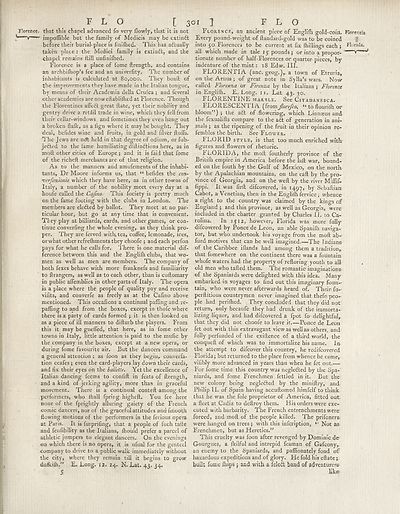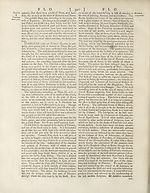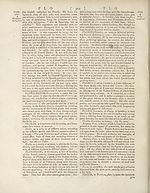Encyclopaedia Britannica > Volume 7, ETM-GOA
(327) Page 301
Download files
Complete book:
Individual page:
Thumbnail gallery: Grid view | List view

FLO [ 301 ] FLO
^Florence, that this chapel advanced fo very flowly, that it is not
impoffible but the family of Medicis may be extindl
before their burial-place is fmilhed. This has a&ually
taken place : the Medici family is extinft, and the
chapel remains Hill unfiniflied.
Florence is a place of fome ftrength, and contains
an archbilhop’s fee and an univerfity. The number of
inhabitants is calculated at 80,000. They boaft of
the improvements they have made in the Italian tongue,
by means of their Academia della Crufca ; and feveral
other academies are noweftablilhed at Florence. Though
the Florentines affedt great ftate, yet their nobility and
gentry drive a retail trade in wine, which they fell from
their cellar-windows, and fometimes they even hang out
a broken flalk, as a iign where it may be bought. They
deal, befides wine and fruits, in gold and filver fluffs.
The Jews are ncft held in that degree of odium, orfub-
jefted to the fame humiliating diflinftions here, as in
moft other cities of Europe ; and it is faid that fome
of the richeft merchants are of that religion.
As to the manners and amufements of the inhabi¬
tants, Dr Moore informs us, that “ befides the con-
veffanionis which they have here, as in other towns of
Italy, a number of the nobility meet every day at a
houfe called the Cafino. This fociety is pretty much
on the fame footing with the clubs in London. The
members are ele&ed by ballot. They meet at no par¬
ticular hour, but go at any time that is convenient.
They play at billiards, cards, and other games, or con¬
tinue converfing the whole evening, as they think pro¬
per. They are ferved with, tea, coffee, lemonade, ices,
or what other refrefhments they choofe ; and each perfon
pays for what he calls for. There is one material dif¬
ference between this and the Englifh clubs, that wo¬
men as well as men are members. The company of
both fexes behave with more franknefs and familiarity
to ftrangers, as well as to each other, than is cuftomary
in public affemblies in other parts of Italy. The opera
is a place where the people of quality pay and receive
vifits, and converfe as freely as at the Cafino above
mentioned. This occaflons a continual paffing and re¬
pairing to and from the boxes, except in thofe where
there is a party of cards formed 'r it is then looked on
as a piece of ill manners to difturb the players. From
this it may be gueffed, that here, as in fome other
towns in Italy, little attention is paid to the mufic by
the company in the boxes, except at a new opera, or
during fome favourite air. But the dancers command
a general attention 1 as foon as they begin, converfa-
tion ceafes; even the card-players lay down their cards,
and fix their eyes on the ballette. Yet the excellence of
Italian dancing feems to confift in feats of ftrength,
and a kind of jerking agility, more than in graceful
movement. There is a continual conteft among the
performers, who fhall fpring higheft. You fee here
none of the fprightly alluring gaiety of the French
comic dancers, nor of the graceful attitudes and fmooth
flowing motions of the performers in the ferious opera
at Paris. It is furprifing, that a people of fuch tafle
and fenfibility as the Italians, fhould prefer a parcel of
athletic jumpers to elegant dancers. On the evenings
on which there is no opera, it is ufual for the genteel
company to drive to a public walk immediately without
the city, where they remain till it begins to grow
dufkifh.” E. Long. 12. 24. N. Lat. 43.34.
5
Florence, an ancient piece of Englifh gold-coin. Florentsa
Every pound-weight of ftandard-gold was to be coined H
into 50 Florences to be current at fix fhiilings each ; Florida,
all which made in tale 15 pounds; or into a propor- —v——
tionate number of half-Florences or quarter-pieces, by
indenture of the mint: 18 Edw. III.
FLORENTIA (anc. geog.),, a town of Etruria,
on the Arnus ; of great note in- Sylla’s wars. Now
called Floren%a or Firenza by the Italians ; Florence
in Englifh. E. Long. 1 (. Lat 43. 30.
FLORENTINE marble. See Citadanesca.
FLOREbCEN 1IA (fromJloreJco, “ to flourifh or
bloom”) ; the aft of flowering, which Linnseus and
the fexualifts compare to the aft of generation in ani¬
mals ; as the ripening of the fruit in their opinion re-
fembles the birth. See Flower.
FLORID style, is that too much enriched with*
figures and flowers of rhetoric.
FLORIDA, the molt foutherly province of the
Britifh empire in America before the lafl war, bound¬
ed on the fouth by the Gulf of Mexico, on the north,
by the Apalachian mountains, on the eaft by the pro¬
vince of Georgia, and on the weft by the river Miflif-
fippi. It was firft difeovered, in 1497, by Sebaltian
Cabot, a Venetian, then in the Englifh fervice ; whence
a right to the country was claimed by the kings of
England ; and this province, as well as Georgia, were
included in the charter granted by Charles II. to Ca¬
rolina. In 1512, however, Florida was more fully
difeovered by Ponce de Leon, an able Spanifh naviga¬
tor, but who undertook his voyage from the moft ab-
furd motives that can be well imagined.—The Indians
of the Caribbee iflands had among them a tradition,,
that fomewhere on the continent there was a fountain
whofe waters had the property of reftoring youth to all
old men who tafted them. The romantic imaginations,
of the Spaniards were delighted with this idea. Many
embarked in voyages to find out this imaginary foun¬
tain, who were never afterwards heard of. Their fu--
perftitious countrymen never imagined that thefe peo¬
ple had perifhed. They concluded that they did not
return, only becaufe they had drunk of the immorta¬
lizing liquor, and had difeovered a fpot fo delightful,
that they did not choofe to leave it Ponce de Leon
fet out with this extravagant view as well as others, and
fully perfuaded of the exiftence of a third world, the
conqueft of which was to immortalize his name. In
the attempt to difeover this country, he redifeovered
Florida; but returned to the place from whence he came,
vifibly more advanced in years than when he fet out.—
For fome time this country was neglefted by the Spa¬
niards, and fome Frenchmen fettled in it. But the
new colony being neglefted by the miniftry, and
Philip II. of Spain having accuftomed himfelf to think
that he was the foie proprietor of America, fitted out
a fleet at Cadiz to deftroy them. His orders were exe¬
cuted with barbarity. The French entrenchments were
forced, and moft of the people killed. The prifoners
were hanged on trees; with this infeription, Not as
Frenchmen, but as Heretics.”
This cruelty was foon after revenged by Dominic de-
Gourgues, a fkilful and intrepid feaman of Gafcony,
an enemy to the Spaniards, and paffionately fond of
hazardous expeditions and of glory. He fold his eftate;
built fome Ihips; and with a feleft band of adventurers
^Florence, that this chapel advanced fo very flowly, that it is not
impoffible but the family of Medicis may be extindl
before their burial-place is fmilhed. This has a&ually
taken place : the Medici family is extinft, and the
chapel remains Hill unfiniflied.
Florence is a place of fome ftrength, and contains
an archbilhop’s fee and an univerfity. The number of
inhabitants is calculated at 80,000. They boaft of
the improvements they have made in the Italian tongue,
by means of their Academia della Crufca ; and feveral
other academies are noweftablilhed at Florence. Though
the Florentines affedt great ftate, yet their nobility and
gentry drive a retail trade in wine, which they fell from
their cellar-windows, and fometimes they even hang out
a broken flalk, as a iign where it may be bought. They
deal, befides wine and fruits, in gold and filver fluffs.
The Jews are ncft held in that degree of odium, orfub-
jefted to the fame humiliating diflinftions here, as in
moft other cities of Europe ; and it is faid that fome
of the richeft merchants are of that religion.
As to the manners and amufements of the inhabi¬
tants, Dr Moore informs us, that “ befides the con-
veffanionis which they have here, as in other towns of
Italy, a number of the nobility meet every day at a
houfe called the Cafino. This fociety is pretty much
on the fame footing with the clubs in London. The
members are ele&ed by ballot. They meet at no par¬
ticular hour, but go at any time that is convenient.
They play at billiards, cards, and other games, or con¬
tinue converfing the whole evening, as they think pro¬
per. They are ferved with, tea, coffee, lemonade, ices,
or what other refrefhments they choofe ; and each perfon
pays for what he calls for. There is one material dif¬
ference between this and the Englifh clubs, that wo¬
men as well as men are members. The company of
both fexes behave with more franknefs and familiarity
to ftrangers, as well as to each other, than is cuftomary
in public affemblies in other parts of Italy. The opera
is a place where the people of quality pay and receive
vifits, and converfe as freely as at the Cafino above
mentioned. This occaflons a continual paffing and re¬
pairing to and from the boxes, except in thofe where
there is a party of cards formed 'r it is then looked on
as a piece of ill manners to difturb the players. From
this it may be gueffed, that here, as in fome other
towns in Italy, little attention is paid to the mufic by
the company in the boxes, except at a new opera, or
during fome favourite air. But the dancers command
a general attention 1 as foon as they begin, converfa-
tion ceafes; even the card-players lay down their cards,
and fix their eyes on the ballette. Yet the excellence of
Italian dancing feems to confift in feats of ftrength,
and a kind of jerking agility, more than in graceful
movement. There is a continual conteft among the
performers, who fhall fpring higheft. You fee here
none of the fprightly alluring gaiety of the French
comic dancers, nor of the graceful attitudes and fmooth
flowing motions of the performers in the ferious opera
at Paris. It is furprifing, that a people of fuch tafle
and fenfibility as the Italians, fhould prefer a parcel of
athletic jumpers to elegant dancers. On the evenings
on which there is no opera, it is ufual for the genteel
company to drive to a public walk immediately without
the city, where they remain till it begins to grow
dufkifh.” E. Long. 12. 24. N. Lat. 43.34.
5
Florence, an ancient piece of Englifh gold-coin. Florentsa
Every pound-weight of ftandard-gold was to be coined H
into 50 Florences to be current at fix fhiilings each ; Florida,
all which made in tale 15 pounds; or into a propor- —v——
tionate number of half-Florences or quarter-pieces, by
indenture of the mint: 18 Edw. III.
FLORENTIA (anc. geog.),, a town of Etruria,
on the Arnus ; of great note in- Sylla’s wars. Now
called Floren%a or Firenza by the Italians ; Florence
in Englifh. E. Long. 1 (. Lat 43. 30.
FLORENTINE marble. See Citadanesca.
FLOREbCEN 1IA (fromJloreJco, “ to flourifh or
bloom”) ; the aft of flowering, which Linnseus and
the fexualifts compare to the aft of generation in ani¬
mals ; as the ripening of the fruit in their opinion re-
fembles the birth. See Flower.
FLORID style, is that too much enriched with*
figures and flowers of rhetoric.
FLORIDA, the molt foutherly province of the
Britifh empire in America before the lafl war, bound¬
ed on the fouth by the Gulf of Mexico, on the north,
by the Apalachian mountains, on the eaft by the pro¬
vince of Georgia, and on the weft by the river Miflif-
fippi. It was firft difeovered, in 1497, by Sebaltian
Cabot, a Venetian, then in the Englifh fervice ; whence
a right to the country was claimed by the kings of
England ; and this province, as well as Georgia, were
included in the charter granted by Charles II. to Ca¬
rolina. In 1512, however, Florida was more fully
difeovered by Ponce de Leon, an able Spanifh naviga¬
tor, but who undertook his voyage from the moft ab-
furd motives that can be well imagined.—The Indians
of the Caribbee iflands had among them a tradition,,
that fomewhere on the continent there was a fountain
whofe waters had the property of reftoring youth to all
old men who tafted them. The romantic imaginations,
of the Spaniards were delighted with this idea. Many
embarked in voyages to find out this imaginary foun¬
tain, who were never afterwards heard of. Their fu--
perftitious countrymen never imagined that thefe peo¬
ple had perifhed. They concluded that they did not
return, only becaufe they had drunk of the immorta¬
lizing liquor, and had difeovered a fpot fo delightful,
that they did not choofe to leave it Ponce de Leon
fet out with this extravagant view as well as others, and
fully perfuaded of the exiftence of a third world, the
conqueft of which was to immortalize his name. In
the attempt to difeover this country, he redifeovered
Florida; but returned to the place from whence he came,
vifibly more advanced in years than when he fet out.—
For fome time this country was neglefted by the Spa¬
niards, and fome Frenchmen fettled in it. But the
new colony being neglefted by the miniftry, and
Philip II. of Spain having accuftomed himfelf to think
that he was the foie proprietor of America, fitted out
a fleet at Cadiz to deftroy them. His orders were exe¬
cuted with barbarity. The French entrenchments were
forced, and moft of the people killed. The prifoners
were hanged on trees; with this infeription, Not as
Frenchmen, but as Heretics.”
This cruelty was foon after revenged by Dominic de-
Gourgues, a fkilful and intrepid feaman of Gafcony,
an enemy to the Spaniards, and paffionately fond of
hazardous expeditions and of glory. He fold his eftate;
built fome Ihips; and with a feleft band of adventurers
Set display mode to:
![]() Universal Viewer |
Universal Viewer | ![]() Mirador |
Large image | Transcription
Mirador |
Large image | Transcription
Images and transcriptions on this page, including medium image downloads, may be used under the Creative Commons Attribution 4.0 International Licence unless otherwise stated. ![]()
| Encyclopaedia Britannica > Encyclopaedia Britannica > Volume 7, ETM-GOA > (327) Page 301 |
|---|
| Permanent URL | https://digital.nls.uk/189125480 |
|---|
| Attribution and copyright: |
|
|---|
| Description | Ten editions of 'Encyclopaedia Britannica', issued from 1768-1903, in 231 volumes. Originally issued in 100 weekly parts (3 volumes) between 1768 and 1771 by publishers: Colin Macfarquhar and Andrew Bell (Edinburgh); editor: William Smellie: engraver: Andrew Bell. Expanded editions in the 19th century featured more volumes and contributions from leading experts in their fields. Managed and published in Edinburgh up to the 9th edition (25 volumes, from 1875-1889); the 10th edition (1902-1903) re-issued the 9th edition, with 11 supplementary volumes. |
|---|---|
| Additional NLS resources: |
|

